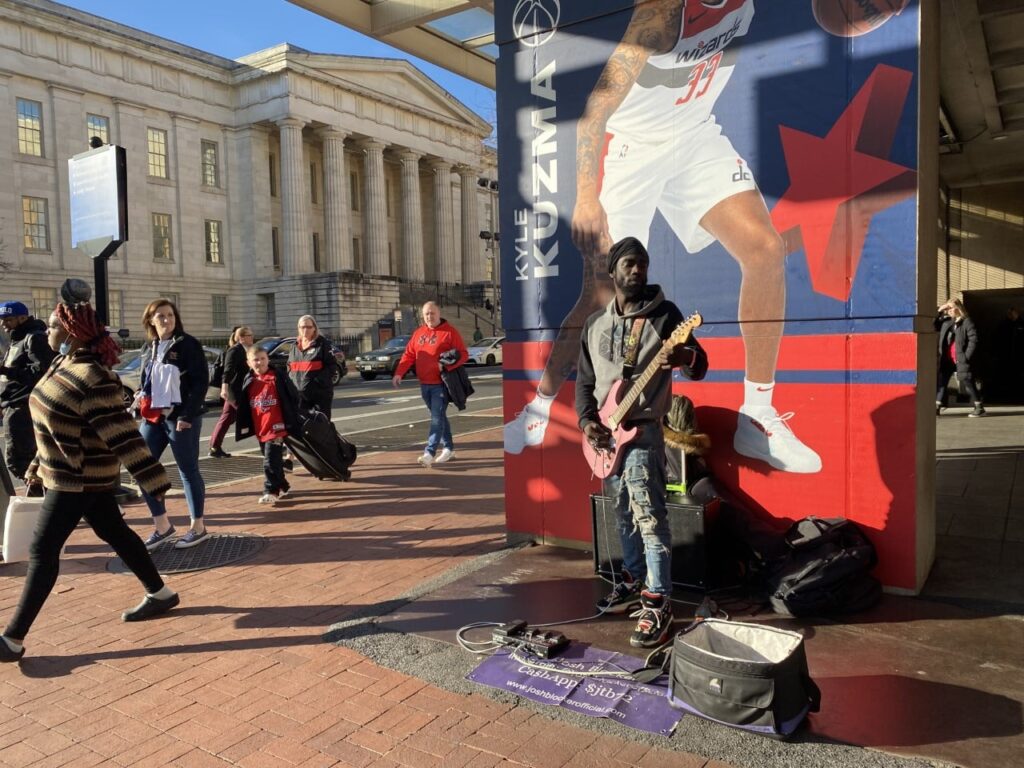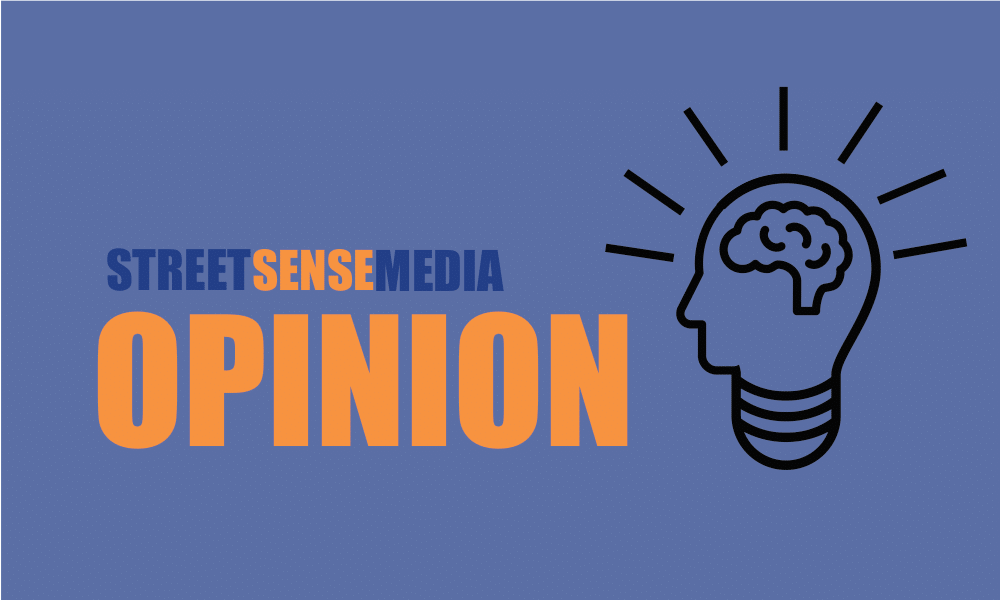On a Saturday night in Georgetown, Josh Blocker and his electric guitar take center stage near the intersection of Wisconsin Avenue and M Street NW. The faint wail of Jimi Hendrix’s “Voodoo Child” struggles to rise above the ambient noise of angry honks and a droning siren. In the seven years Blocker has been performing on the streets of Washington, D.C., the 26-year-old has learned that while he’d like to play louder, he would risk a noise violation by doing so.
“I had somebody come over to me, pull up in their white and red little flagged car, saying ‘Hey, we just gotta tell you to turn it down,’” Blocker said, referring to the Metropolitan Police Department (MPD), which regulates noise in the District. “I think they’re doing too much. We’re outside!”
Under the city’s current criminal code, anyone being “unreasonably loud” between 10 p.m. and 7 a.m. can be arrested. Blocker hoped he’d be able to play louder once the Revised Criminal Code Act of 2022 took effect. Based on over six years of research and deliberation by the Criminal Code Reform Commission (CCRC), the D.C. Council and an advisory group, the bill would have modernized the city’s outdated criminal code. The CCRC recommended removing the noise provision but the council opted not to do so.
The council overrode a mayoral veto after approving the legislation unanimously late last year, but the bill succumbed to the resolution of disapproval introduced by House and Senate Republicans. The Senate voted March 8 to block the D.C. Council legislation, which leaders blasted as “soft on crime.” With President Joe Biden now having signed the disapproval resolution, the council is starting to discuss how to proceed and whether the Revised Criminal Code Act can be revived by addressing concerns raised by congressional opponents as well as Mayor Muriel Bowser. Many of their objections focused on the bill’s reduced penalties for some violent offenses, as well as its resumption of a right to jury trials for most misdemeanors.
The bill’s proponents say low-income residents and residents of color, particularly Black residents — who comprise over 80% of the people the District incarcerates — would have benefited most from the provisions in the updated criminal code.
Most proponents of criminal justice reform believe the bill would have led to largely positive outcomes. Local advocates have praised its elimination of most mandatory minimums and decriminalization of aggressive panhandling and illegal vending. Still, advocates of reform point to missed opportunities in elements of the bill such as the continued criminalization of unreasonably loud noise, public urination and defecation, and possession of open containers of alcohol. The council’s approved version also increased some penalties and fines beyond the recommendations of the Criminal Code Reform Commission.
Experts say an overhaul is long overdue. Many states revised their criminal codes in the 1960s and ensuing decades, but the District’s hasn’t been comprehensively revised since its adoption in 1901. The 122-year-old code is unclear and riddled with racial inequality, according to a Council Office of Racial Equity (CORE) assessment.
The revision process began with approval of the Sentencing and Criminal Code Revision Commission Amendment Act of 2007. The Sentencing and Criminal Code Revision Commission analyzed local and national sentencing data, policies and practices and then made recommendations for more equitable sentencing. In 2016, the CCRC and an Advisory Group were created to kick-start the revision process. Their main goals were to clearly define the District’s criminal laws and establish a penalty structure that’s proportionate and rational, CCRC Executive Director Jinwoo Park explained. In most cases, the new maximums reflect the actual sentences for violent offenses that judges hand down under the current code, a point that council members made frequently in discussing the bill.
The CCRC’s recommendations comprised the introduced version of the bill, which went to the council in 2021 but was adapted by the Committee on the Judiciary and Public Safety after public hearings and later by the full council during deliberations. Objections raised by Mayor Bowser and MPD heavily influenced the changes seen in the committee print, Park said. Although they ultimately weren’t enough to prevent Bowser’s veto, the changes were met with mixed reactions among reform advocates who thought they went too far in many cases.
The introduced version removed the current code’s noise provision, which restricts street performance for those that rely on it to make a living. The committee print reinstated the provision with no definition of “unreasonably loud noise.” DC Justice Lab Executive Director Patrice Sulton considered the provision too vague, although she nonetheless wanted to see the council-approved version become law.
“When you write something that way, it allows police officers to basically arrest someone for raising their voice,” said Sulton, who was previously a senior attorney adviser to the Criminal Code Reform Commission. “It doesn’t tie it to anything like a decibel level that we see in our civil regulations for noise.”

Blocker, whose main source of income is busking, said he can make more money playing for the crowds that emerge from Capital One Arena after late-night basketball and hockey games than he does during the day. The provision makes that more complicated than it might have been.
The committee print also eliminated the planned decriminalization of public urination and defecation. Under the introduced version, a person would not have faced a criminal conviction for relieving themselves outside as long as they didn’t expose their genitals to anyone or destroy property, Sulton said. Under the committee print, going to the bathroom in public is an arrestable offense, as it is under the current code. Experts say this will most impact Black people, who make up the vast majority of D.C. residents experiencing homelessness.
Gerald Anderson, 54, sells newspapers for Street Sense Media and experienced homelessness in the District for 18 years. He’s all too familiar with the bathroom struggle.
“Some people be having it bad,” Anderson said, shaking his head. “I know I’ve wet myself because sometimes I can’t make it. I’ve gotta do what I’ve gotta do.”

Many businesses restrict their restrooms to paying customers, and the city has few public toilets, according to a People for Fairness Coalition study. As the result of a multiyear advocacy campaign, a pilot program will soon produce two public restrooms in high-traffic areas of the city, but some feel it isn’t enough.
“For misguided advocates, it’s going to seem like a win to get two bathrooms,” said 72-year-old Wendell Williams, a local case manager who previously experienced homelessness. “I don’t consider that a win. I consider that disrespectful. I think the question should be, ‘Why don’t we have more than two proposed public bathrooms?’”
Criminal justice reform proponents also criticize the penalty enhancements in the committee print. The introduced version maintained most of the current code’s enhancements but eliminated the “three strikes” penalty. The committee print mirrored these changes and increased enhancements for burglary, robbery and carjacking beyond what’s found in the current code or the introduced version, although the end result would not necessarily be more prison time than currently allowed by law because of the reduced maximum penalties. Longer sentences don’t definitively lead to less crime, experts say. They do disproportionately impact Black District residents, who have a shorter life expectancy than residents of any other race, making them more likely to die in prison or live out most of their lives before release.
Other changes to the introduced version — such as the narrowing of sentencing and a delay for the expanded access to jury trials — could exacerbate this injustice, according to the council’s own racial equity assessment. The committee print also complicated the classification structure of the introduced version by making exceptions for certain offenses. For example, first-degree burglary carries a maximum imprisonment of six years and second-degree burglary carries four even though both are categorized as Class 8 felonies. A complicated code, the CORE assessment stated, makes it harder for non-English speakers to understand the law, confuses jurists and can ultimately lead to racially inequitable outcomes.
The CORE assessment also identified issues common to both the introduced version and the committee print. Both versions, while narrowing the scope of the District’s open container law, maintained it as a criminal violation and applied it to any vehicle on a public road, even if the open container isn’t in the grab area of the driver. Experts say this law would primarily impact Black residents living below the poverty line, who are less likely to own property where they can drink while congregating with friends and who constitute approximately 80% of open container arrests and convictions.
Both versions of the bill increase certain penalties. Based on a “limits on fines” provision that prevents courts from imposing fines that could prohibit someone from paying family and living expenses, anyone found guilty of certain crimes who cannot afford to pay a fine would receive jail time or an alternative, like probation. Again, the CORE assessment found that poor Black residents would be most deeply impacted by this law.
Despite these concerns, reform advocates say there are many aspects of the bill that are racially equitable. The revised code’s decriminalization of aggressive panhandling would be a major step forward, said Brittany Ruffin, the director of policy and advocacy at the Washington Legal Clinic for the Homeless.
“It was just another way to criminalize people experiencing homelessness for trying to fulfill basic needs,” Ruffin said of the existing law.
Sulton pointed out that, under the revised code, a panhandler would still have been subject to arrest for any behavior that constituted assault, such as spitting on someone.
The council-approved bill would also decriminalize illegal vending. Given that District vendors of color are often confronted and jailed by police, this change would help decriminalize poverty and minimize racial inequity, the CORE assessment noted. Street vending could also be decriminalized under another bill that passed first vote on March 7.
Advocates say the revised code’s elimination of most mandatory minimums — apart from one for first-degree murder — represented another win. Research shows that mandatory minimums don’t deter crime and do disproportionately impact District residents of color, particularly Black men. The change is widely endorsed locally: 77% of District residents surveyed support eliminating mandatory minimums, according to a poll commissioned by D.C. Justice Lab and FWD.us.
The council-approved bill isn’t perfect, many reform advocates say, but it’s more equitable than the current code — enough to make adopting the revised criminal code far preferable to maintaining the status quo.
“Until we have a new code, we continue to live under laws that are vague, overlapping gaps in law, and just a penal code that the District didn’t make itself,” Sulton said in an interview with The Guardian.
In a statement following the Senate vote, Amy Fettig, the executive director of The Sentencing Project, echoed the sentiment and denounced “bloated prisons and broken communities with no benefits for public safety” under the current code.
“Today’s bipartisan Senate vote rejecting common sense criminal justice reform signals a widespread abandonment of racial justice and evidence-based policy in favor of political posturing,” Fettig said.
This article was co-published with The DC Line.
Update (03/29/2023)
This article has been updated to add Wendell Williams is also a local case manager.








